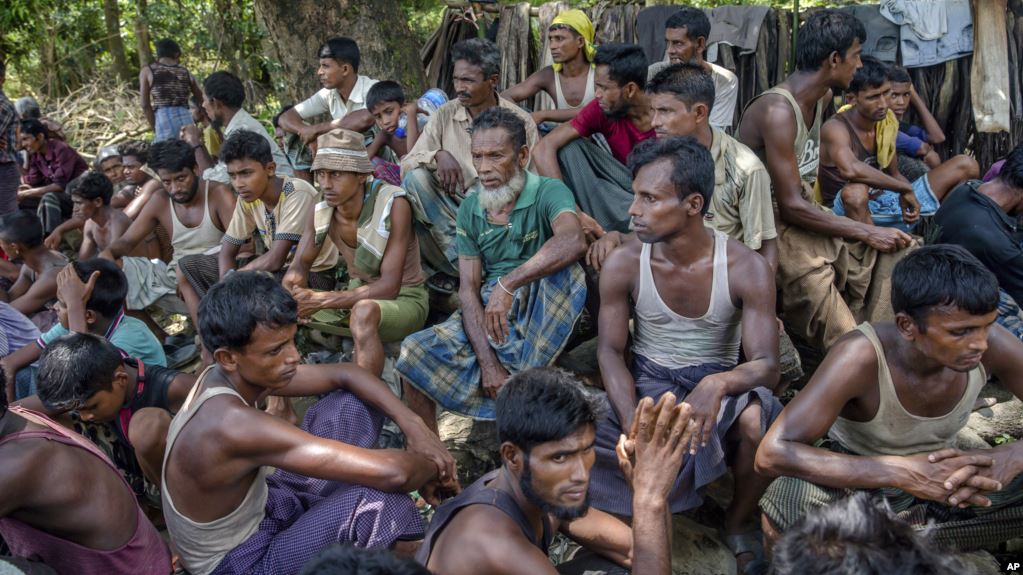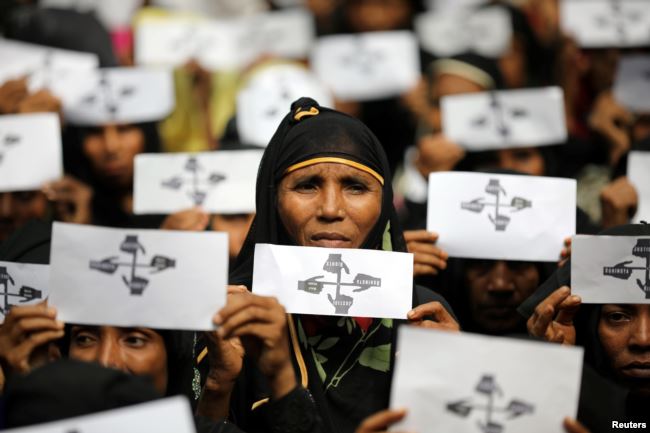Activists: US Stance on Rohingya Not Strong Enough
ASIA-UPDATES ON MYANMAR ROHINGYA GENOCIDE, 1 Oct 2018
William Gallo | VOA News – TRANSCEND Media Service

FILE – Rohingya Muslims from Myanmar wait to carry food items from Bangladesh’s border toward a no man’s land where they set up refugee camps in Tombru, Bangladesh, Sept. 15, 2017.
25 Sep 2018 – Activists are criticizing a long-awaited U.S. State Department investigation into the Myanmar military campaign against Rohingya Muslims, saying the United States should to take a firmer stance on what the activists see as genocide.
The State Department report, released late Monday, blames Myanmar’s military for an “extreme, large-scale, widespread” campaign of violence against the Rohingya ethnic minority group over the past two years.
The report, based on interviews with more than 1,000 Rohingya refugees in neighboring Bangladesh, documented graphic descriptions of torture, rape and mass killing in Myanmar’s northern Rakhine state.
In some cases, Myanmar soldiers threw infants and small children into open fires and burning huts, witnesses told State Department investigators. Others said they saw soldiers ripping fetuses out of the bellies of pregnant mothers.
The State Department concedes the campaign was “well-planned and coordinated.” But, notably, the report makes no determination that any of the violence amounts to genocide or crimes against humanity, and it recommends no specific action.
“This is extremely disappointing for those of us who have no other country to look to but the United States to do something humane and compassionate and principled,” said Maung Zarni, a British-Burmese academic and author of The Slow-Burning Genocide of Myanmar’s Rohingya.
“This is not like Rwanda or other places where post facto people realized that genocide happened. This is still ongoing,” Zarni said.
The press office of U.S. Senator Marco Rubio, a Florida Republican, weighed in as well:
Important @StateDept report on Burmese forces’ atrocities against Rohingya in Rakhine state. I called for the report to be made public, and urged accountability for these crimes against humanity. The State Department must call this what it is: genocide https://t.co/zGwGfbh08j
— Senator Marco Rubio (@SenMarcoRubio) September 25, 2018
Human Rights Watch (HRW) chided the State Department for being “silent on action” and said the U.S. government should follow up the report by imposing new sanctions against those responsible.
“The State Department’s report, confirming the systematic brutality of the Burmese military operations, should jolt the U.S. into action,” Sarah Margon, Washington director at HRW, said.
In August, the U.S. sanctioned four Myanmar military and police commanders for their involvement in what the State Department then referred to as “ethnic cleansing” in Rakhine state.
The latest report, however, did not use the phrase “ethnic cleansing.” But the State Department, in an nonattributed statement, said the investigation’s findings “fully support that conclusion” and insisted it would be used to inform future U.S. policy.
“U.S. efforts have been and remain focused on addressing the underlying conduct, encouraging steps that will improve the situation for all people in Burma and those displaced in Burma, and promoting accountability for those responsible for these crimes,” the statement said.
Effect of terminology
The term ethnic cleansing carries less weight in international law than do the terms genocide or crimes against humanity. The Trump administration is reportedly divided about whether to apply those labels, in part because some fear it could compel the U.S. to intervene.

FILE – Rohingya refugee women hold placards as they take part in a protest at the Kutupalong refugee camp to mark the one-year anniversary of their exodus from Myanmar, in Cox’s Bazar, Bangladesh, Aug. 25, 2018.
British author Zarni stressed that intervention does not have to take the form of bombs or even U.N. peacekeepers. It could instead mean the deployment of temporary human rights observers or civilian advisers to Myanmar’s government, he added.
“No one is calling for military intervention. But people want some sort of international mechanism to provide safety for those inside the country and for those who may return,” he said. “These are things that need to be discussed — not simply being scared of needing to bomb.”
A U.N.-mandated fact-finding mission in August recommended that Myanmar generals be investigated for genocide and crimes against humanity. It said that estimates of 10,000 deaths were “conservative.” More than 725,000 Rohingya have fled to Bangladesh over the past year.
Myanmar’s military-dominated government denies oppressing the Rohingya. It claims it is responding to a series of attacks by Rohingya militants on police stations.
The Rohingya have long complained of discrimination in Myanmar, including being refused citizenship.
___________________________________________
 A Buddhist humanist from Burma, Maung Zarni is a member of the TRANSCEND Network for Peace Development Environment, former Visiting Lecturer with Harvard Medical School, specializing in racism and violence in Burma and Sri Lanka, and Non-resident Scholar in Genocide Studies with Documentation Center – Cambodia. Zarni is coordinator for Strategic Affairs for Free Rohingya Coalition and an adviser to the European Centre for the Study of Extremism, Cambridge, UK. His analyses have appeared in leading newspapers including the New York Times, The Guardian and the Times. Among his academic publications on Rohingya genocide are The Slow-Burning Genocide of Myanmar’s Rohingyas (Pacific Rim Law and Policy Journal), An Evolution of Rohingya Persecution in Myanmar: From Strategic Embrace to Genocide, (Middle East Institute, American University), and Myanmar’s State-directed Persecution of Rohingyas and Other Muslims (Brown World Affairs Journal, forthcoming). He holds a PhD (U Wisconsin at Madison) and a MA (U California), and has held various teaching, research and visiting fellowships at the universities in Asia, Europe and USA including Oxford, LSE, UCL Institute of Education) , National-Louis, Malaya, and Brunei. He is the recipient of the “Cultivation of Harmony” award from the Parliament of the World’s Religions (2015).
A Buddhist humanist from Burma, Maung Zarni is a member of the TRANSCEND Network for Peace Development Environment, former Visiting Lecturer with Harvard Medical School, specializing in racism and violence in Burma and Sri Lanka, and Non-resident Scholar in Genocide Studies with Documentation Center – Cambodia. Zarni is coordinator for Strategic Affairs for Free Rohingya Coalition and an adviser to the European Centre for the Study of Extremism, Cambridge, UK. His analyses have appeared in leading newspapers including the New York Times, The Guardian and the Times. Among his academic publications on Rohingya genocide are The Slow-Burning Genocide of Myanmar’s Rohingyas (Pacific Rim Law and Policy Journal), An Evolution of Rohingya Persecution in Myanmar: From Strategic Embrace to Genocide, (Middle East Institute, American University), and Myanmar’s State-directed Persecution of Rohingyas and Other Muslims (Brown World Affairs Journal, forthcoming). He holds a PhD (U Wisconsin at Madison) and a MA (U California), and has held various teaching, research and visiting fellowships at the universities in Asia, Europe and USA including Oxford, LSE, UCL Institute of Education) , National-Louis, Malaya, and Brunei. He is the recipient of the “Cultivation of Harmony” award from the Parliament of the World’s Religions (2015).
VOA’s Cindy Saine contributed to this report.
DISCLAIMER: The statements, views and opinions expressed in pieces republished here are solely those of the authors and do not necessarily represent those of TMS. In accordance with title 17 U.S.C. section 107, this material is distributed without profit to those who have expressed a prior interest in receiving the included information for research and educational purposes. TMS has no affiliation whatsoever with the originator of this article nor is TMS endorsed or sponsored by the originator. “GO TO ORIGINAL” links are provided as a convenience to our readers and allow for verification of authenticity. However, as originating pages are often updated by their originating host sites, the versions posted may not match the versions our readers view when clicking the “GO TO ORIGINAL” links. This site contains copyrighted material the use of which has not always been specifically authorized by the copyright owner. We are making such material available in our efforts to advance understanding of environmental, political, human rights, economic, democracy, scientific, and social justice issues, etc. We believe this constitutes a ‘fair use’ of any such copyrighted material as provided for in section 107 of the US Copyright Law. In accordance with Title 17 U.S.C. Section 107, the material on this site is distributed without profit to those who have expressed a prior interest in receiving the included information for research and educational purposes. For more information go to: http://www.law.cornell.edu/uscode/17/107.shtml. If you wish to use copyrighted material from this site for purposes of your own that go beyond ‘fair use’, you must obtain permission from the copyright owner.
Read more
Click here to go to the current weekly digest or pick another article:
ASIA-UPDATES ON MYANMAR ROHINGYA GENOCIDE: